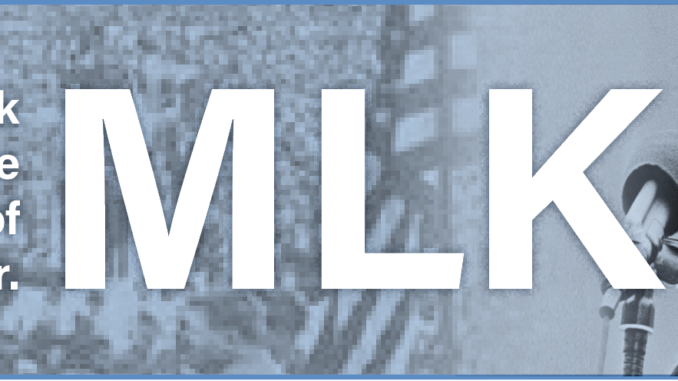
By Kenya Zardaman-Ramirez,
Contributing Writer,
The 1950s were a dark time for the black man in America. Back then, the black man – an important yet oppressed worker responsible for facilitating this nation’s economic framework – was not even allowed to freely walk its streets. In reward for his sweat and labor, he was betrayed and demeaned. In the 1950s, it was ordinary for the black man to be reduced to less than, to be defiled in front of his family. And, it was completely commonplace for his simple aspirations – towards integration into society – to be decried as wanton immorality, to be deemed as criminal and illegal. But, in 1955, Dr. Martin Luther King Jr. stood up, along side Rosa Parks, to organize the first formal resistance to the black man’s displacement to second class citizenship. With the Montgomery Bus Boycotts, Dr. King used economic opposition to denounce the Jim Crow Laws that held blacks separate and unequal in the South.
Through revolt, Dr. King pushed relegated riders to the front of the bus and the South’s licit discrimination to the forefront – while setting precedent with a practice that has trended into tradition.
Dr. King left us a legacy of protest, a heritage of increased presence and raised voices, a history of planning and forcing change. Dr. King decidedly left the sanctity of his pulpit to stand, with his people, on the very streets that were unsafe for them to walk – just as we do today.
The year, 2020, was – admittedly – one of pandemic infection and epic insurrection. George Floyd’s senseless killing was one of the final atrocities in a litany of deaths at the hands of this nation’s law enforcement. It was the igniting match in a hotbed of uprising. But, most of all, Floyd’s death was the defining event that set forth a moment of international solidarity. In a domino effect that delineated the world’s collective abhorrence of the United State’s blatant police brutality, global protestors occupied public areas and shouted their indifference. The website, CNN.com, retells that, “As the protests continued in the United States, for a second week, in response to the killing of George Floyd, people from around the world began to stand up with them. From London to Pretoria to Sydney, people took to the streets to express the need for police reform and racial equality. Many held signs that read “Black Lives Matter,” while others kneeled. At some protests, marchers stood in silence for the amount of time that Floyd struggled to breathe while a police officers detained him.”
This increased attention exposed this grave injustice and won charges of second degree murder for the officer who held his knee on George’s neck for 8 minutes and 45 seconds and aiding and abetting for the other officers involved. The Facebook hashtag, #georgefloydprotests, spins round a colorful panorama of the worldwide demonstrations dedicated to George’s cause.
Additionally, a lesser known element of Dr. King’s mission was nationally demonstrated, right before his demise. In his article, “Economic Equality: Martin Luther King Jr.’s Other Dream,” Douglas E. Thompson denotes that, “We have little trouble remembering the Reverend Martin Luther King Jr. as a civil rights icon. But, we rarely do the harder work of remembering the full King, reconstructing the many complicated and controversial parts of what he did and said. We particularly fail to remember his call for Americans to do something hard, but necessary: redistribute wealth.” Dr. King’s final crusade, The Poor People’s Campaign, laid foundation for the upcoming assembly of the first black-owned stock market in United States history – The Dream Exchange.
In attempts to fully uproot the problems of poverty and unemployment, The Dream Exchange founder, Joe Cecala, positions his firm as liaison between black business and investor, realizing that business investment is an integral building block of wealth generation in needy communities. Cecala imparts that, “The importance of a black-owned stock exchange cannot be understated. Research from the SEC’s IPO Task Force shows that 92% of all jobs are created after a company goes public.” This intelligence, from the IPO Task Force, evidences The Dream Exchange’s potential to create occupational opportunities for black communities with each black business that it lists.
So, no, Dr. King did not die on the cold concrete of a motel balcony. His eyes dulled, but his vision burgeoned brightly, becoming a brilliant spectacle for his faithful followers. His famous speeches transcended into phenomenal thunderings, echoing God’s assurances of equality. Dr. King’s death was mere plot in an ongoing play of good against evil – its ending nearing with each victory. We still carry on in his name.


Be the first to comment